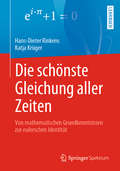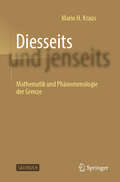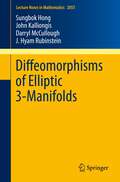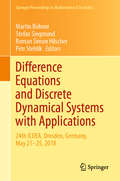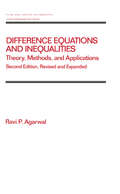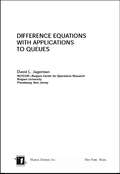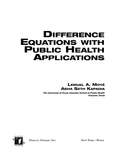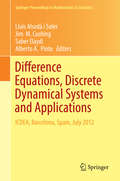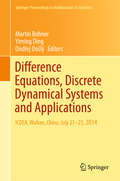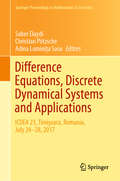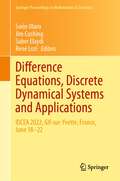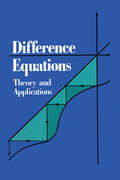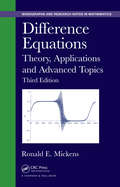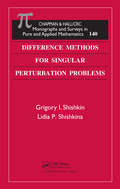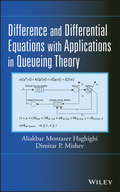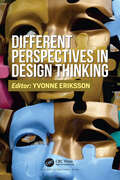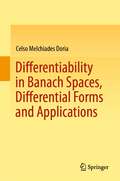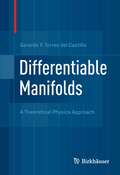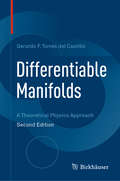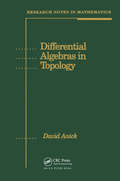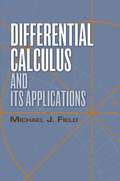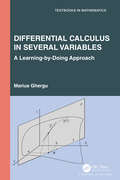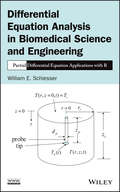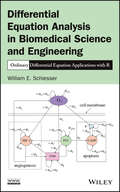- Table View
- List View
Die schönste Gleichung aller Zeiten: Von mathematischen Grundkenntnissen zur eulerschen Identität
by Katja Krüger Hans-Dieter RinkensIn diesem Buch geht es um die fünf wichtigsten Zahlen: Außer 0 und 1 gibt es kaum noch wichtigere Zahlen als π, i und e.Die Kreiszahl π ist nicht nur eine Sache der Geometrie: Bekanntes wird aufgefrischt und Erstaunliches hinzugelernt. Die imaginäre Einheit i befreit uns von der Rechenstörung, aus negativen Zahlen nicht die Wurzel ziehen zu dürfen oder zu können. Die Euler-Zahl e liegt fast allen Wachstums- und Zerfallsprozessen zugrunde: Die e-Funktion ist wohl die wichtigste mathematische Funktion überhaupt. In dem Lehrbuch geht es um eine bemerkenswerte Beziehung zwischen den fünf Zahlen, die Eulersche Gleichung, "die schönste Formel der Mathematik", wie viele Mathematiker finden. Es soll den Weg zum Verständnis der geheimnisvollen Formel beschreiben. Dieser Weg führt durch zentrale Gebiete der Mathematik: Geometrie einschließlich Trigonometrie, Arithmetik und Algebra sowie Analysis mit einem Blick in wissenschaftliches Rechnen. Nicht die Systematik dieser Gebiete steht im Vordergrund, sondern die fundamentalen Ideen, die zum Entstehen der Formel beitragen.
Diesseits und jenseits: Mathematik und Phänomenologie der Grenze
by Mario H. KrausDieses Buch behandelt Grenzen als allgegenwärtige Erscheinungen verschiedener Lebenswelten. Grenzen markieren stets Zweiseitigkeit: Es gibt genau zwei Seiten, auf beiden ist oder geschieht jeweils etwas anderes, aber niemals Nichts. Der Autor arbeitet anhand verschiedenster Beispiele wesentliche Gemeinsamkeiten und Unterschiede verschiedener Grenzbegriffe in räumlichen, zeitlichen und gesellschaftlichen Kontexten heraus. Er entwirft einen fachübergreifenden Grenzbegriff, der Ausgangspunkt für eine Limologie, eine Lehre von den Grenzen, sein kann. Die Mathematik hilft dabei, zugrundeliegende Gesetzmäßigkeiten zu verstehen; die Phänomenologie vermittelt zwischen Theorie und Praxis. Das Buch bietet somit wertvolle Impulse für fachübergreifend Interessierte u.a. mit Hintergründen in Mathematik, Physik, Geographie, Architektur, Soziologie, Psychologie oder Philosophie.
Diffeomorphisms of Elliptic 3-Manifolds
by Darryl Mccullough J. Hyam Rubinstein John Kalliongis Sungbok HongThis work concerns the diffeomorphism groups of 3-manifolds, in particular of elliptic 3-manifolds. These are the closed 3-manifolds that admit a Riemannian metric of constant positive curvature, now known to be exactly the closed 3-manifolds that have a finite fundamental group. The (Generalized) Smale Conjecture asserts that for any elliptic 3-manifold M, the inclusion from the isometry group of M to its diffeomorphism group is a homotopy equivalence. The original Smale Conjecture, for the 3-sphere, was proven by J. Cerf and A. Hatcher, and N. Ivanov proved the generalized conjecture for many of the elliptic 3-manifolds that contain a geometrically incompressible Klein bottle. The main results establish the Smale Conjecture for all elliptic 3-manifolds containing geometrically incompressible Klein bottles, and for all lens spaces L(m,q) with m at least 3. Additional results imply that for a Haken Seifert-fibered 3 manifold V, the space of Seifert fiberings has contractible components, and apart from a small list of known exceptions, is contractible. Considerable foundational and background
Difference Equations and Discrete Dynamical Systems with Applications: 24th ICDEA, Dresden, Germany, May 21–25, 2018 (Springer Proceedings in Mathematics & Statistics #312)
by Martin Bohner Stefan Siegmund Roman Šimon Hilscher Petr StehlíkThis book presents the proceedings of the 24th International Conference on Difference Equations and Applications, which was held at the Technical University in Dresden, Germany, in May 2018, under the auspices of the International Society of Difference Equations (ISDE). The conference brought together leading researchers working in the respective fields to discuss the latest developments, and to promote international cooperation on the theory and applications of difference equations. This book appeals to researchers and scientists working in the fields of difference equations and discrete dynamical systems and their applications.
Difference Equations and Inequalities: Theory, Methods, and Applications
by Ravi P. AgarwalA study of difference equations and inequalities. This second edition offers real-world examples and uses of difference equations in probability theory, queuing and statistical problems, stochastic time series, combinatorial analysis, number theory, geometry, electrical networks, quanta in radiation, genetics, economics, psychology, sociology, and
Difference Equations by Differential Equation Methods
by Peter E. HydonMost well-known solution techniques for differential equations exploit symmetry in some form. Systematic methods have been developed for finding and using symmetries, first integrals and conservation laws of a given differential equation. Here the author explains how to extend these powerful methods to difference equations, greatly increasing the range of solvable problems. Beginning with an introduction to elementary solution methods, the book gives readers a clear explanation of exact techniques for ordinary and partial difference equations. The informal presentation is suitable for anyone who is familiar with standard differential equation methods. No prior knowledge of difference equations or symmetry is assumed. The author uses worked examples to help readers grasp new concepts easily. There are 120 exercises of varying difficulty and suggestions for further reading. The book goes to the cutting edge of research; its many new ideas and methods make it a valuable reference for researchers in the field.
Difference Equations with Applications to Queues (Chapman And Hall/crc Pure And Applied Mathematics Ser. #Vol. 233)
by David L. Jagerman"Presents a theory of difference and functional equations with continuous argument based on a generalization of the Riemann integral introduced by N.E. Norlund, allowing differentation with respect to the independent variable and permitting greater flexibility in constructing solutions and approximations. Discusses linear transformations that state conditions for convergence of Newton series and Norlund sums!"
Difference Equations with Public Health Applications (Chapman & Hall/CRC Biostatistics Series)
by Asha Seth Kapadia Lemuel A. MoyéThis study of difference equations with public health applications develops the methodology for the solution of the general kth order linear difference equation using the generating function approach. It includes an examination of the dynamics of disease spread and containment in populations using illness-death models. There are over 1000 featured
Difference Equations, Discrete Dynamical Systems and Applications
by Alberto A. Pinto Jim M. Cushing Saber Elaydi Lluís Alsedà i SolerThese proceedings of the 18th International Conference on Difference Equations and Applications cover a number of different aspects of difference equations and discrete dynamical systems, as well as the interplay between difference equations and dynamical systems. The conference was organized by the Department of Mathematics at the Universitat Aut#65533;noma de Barcelona (UAB) under the auspices of the International Society of Difference Equations (ISDE) and held in Barcelona (Catalonia, Spain) in July 2012. Its purpose was to bring together experts and novices in these fields to discuss the latest developments. The book gathers contributions in the field of combinatorial and topological dynamics, complex dynamics, applications of difference equations to biology, chaotic linear dynamics, economic dynamics and control and asymptotic behavior, and periodicity of difference equations. As such it is of interest to researchers and scientists engaged in the theory and applications of difference equations and discrete dynamical systems.
Difference Equations, Discrete Dynamical Systems and Applications
by Martin Bohner Yiming Ding Ondřej DošlýThese proceedings of the 20th International Conference on Difference Equations and Applications cover the areas of difference equations, discrete dynamical systems, fractal geometry, difference equations and biomedical models, and discrete models in the natural sciences, social sciences and engineering. The conference was held at the Wuhan Institute of Physics and Mathematics, Chinese Academy of Sciences (Hubei, China), under the auspices of the International Society of Difference Equations (ISDE) in July 2014. Its purpose was to bring together renowned researchers working actively in the respective fields, to discuss the latest developments, and to promote international cooperation on the theory and applications of difference equations. This book will appeal to researchers and scientists working in the fields of difference equations, discrete dynamical systems and their applications.
Difference Equations, Discrete Dynamical Systems and Applications: ICDEA 23, Timişoara, Romania, July 24-28, 2017 (Springer Proceedings in Mathematics & Statistics #287)
by Christian Pötzsche Saber Elaydi Adina Luminiţa SasuThe book presents the proceedings of the 23rd International Conference on Difference Equations and Applications, ICDEA 2017, held at the West University of Timișoara, Romania, under the auspices of the International Society of Difference Equations (ISDE), July 24 - 28, 2017. It includes new and significant contributions in the field of difference equations, discrete dynamical systems and their applications in various sciences. Disseminating recent studies and related results and promoting advances, the book appeals to PhD students, researchers, educators and practitioners in the field.
Difference Equations, Discrete Dynamical Systems and Applications: IDCEA 2022, Gif-sur-Yvette, France, June 18–22 (Springer Proceedings in Mathematics & Statistics #444)
by Sorin Olaru Saber Elaydi René Lozi Jim CushingThis book presents contributions related to new research results presented at the 27th International Conference on Difference Equations and Applications, ICDEA 2022, that was held at CentraleSupélec, Université Paris-Saclay, France, under the auspices of the International Society of Difference Equations (ISDE), July 18–22, 2022. The book aims not only to disseminate these results but to foster further advances in the fields of difference equations and discrete dynamical systems. Also included are applications to economic growth modeling, population dynamics, epidemic modeling, game theory, control systems, and network analysis. The target audience for the book includes Ph.D. students, researchers, educators, and practitioners in these fields.
Difference Equations, Second Edition
by Ronald E. MickensIn recent years, the study of difference equations has acquired a new significance, due in large part to their use in the formulation and analysis of discrete-time systems, the numerical integration of differential equations by finite-difference schemes, and the study of deterministic chaos. The second edition of Difference Equations: Theory and Applications provides a thorough listing of all major theorems along with proofs. The text treats the case of first-order difference equations in detail, using both analytical and geometrical methods. Both ordinary and partial difference equations are considered, along with a variety of special nonlinear forms for which exact solutions can be determined. Numerous worked examples and problems allow readers to fully understand the material in the text. They also give possible generalization of the theorems and application models.The text's expanded coverage of application helps readers appreciate the benefits of using difference equations in the modeling and analysis of "realistic" problems from a broad range of fields. The second edition presents, analyzes, and discusses a large number of applications from the mathematical, biological, physical, and social sciences. Discussions on perturbation methods and difference equation models of differential equation models of differential equations represent contributions by the author to the research literature. Reference to original literature show how the elementary models of the book can be extended to more realistic situations.Difference Equations, Second Edition gives readers a background in discrete mathematics that many workers in science-oriented industries need as part of their general scientific knowledge. With its minimal mathematical background requirements of general algebra and calculus, this unique volume will be used extensively by students and professional in science and technology, in areas such as applied mathematics, control theory, population science, economics, and electronic circuits, especially discrete signal processing.
Difference Equations: Theory, Applications and Advanced Topics, Third Edition (Chapman & Hall/CRC Monographs and Research Notes in Mathematics)
by Ronald E. MickensDifference Equations: Theory, Applications and Advanced Topics, Third Edition provides a broad introduction to the mathematics of difference equations and some of their applications. Many worked examples illustrate how to calculate both exact and approximate solutions to special classes of difference equations. Along with adding several advanced to
Difference Methods for Singular Perturbation Problems (Monographs and Surveys in Pure and Applied Mathematics)
by Grigory I. Shishkin Lidia P. Shishkina� Difference Methods for Singular Perturbation Problems focuses on the development of robust difference schemes for wide classes of boundary value problems. It justifies the ε-uniform convergence of these schemes and surveys the latest approaches important for further progress in numerical methods.The first part of the book e
Difference and Differential Equations with Applications in Queueing Theory
by Aliakbar Montazer Haghighi Dimitar P. MishevA Useful Guide to the Interrelated Areas of Differential Equations, Difference Equations, and Queueing ModelsDifference and Differential Equations with Applications in Queueing Theory presents the unique connections between the methods and applications of differential equations, difference equations, and Markovian queues. Featuring a comprehensive collection of topics that are used in stochastic processes, particularly in queueing theory, the book thoroughly discusses the relationship to systems of linear differential difference equations.The book demonstrates the applicability that queueing theory has in a variety of fields including telecommunications, traffic engineering, computing, and the design of factories, shops, offices, and hospitals. Along with the needed prerequisite fundamentals in probability, statistics, and Laplace transform, Difference and Differential Equations with Applications in Queueing Theory provides:A discussion on splitting, delayed-service, and delayed feedback for single-server, multiple-server, parallel, and series queue modelsApplications in queue models whose solutions require differential difference equations and generating function methodsExercises at the end of each chapter along with select answersThe book is an excellent resource for researchers and practitioners in applied mathematics, operations research, engineering, and industrial engineering, as well as a useful text for upper-undergraduate and graduate-level courses in applied mathematics, differential and difference equations, queueing theory, probability, and stochastic processes.
Different Perspectives in Design Thinking
by Yvonne ErikssonGlobalization and digitalization are buzz words in contemporary society. They affect both our private and our professional lives. Society has become more diverse with easier access to information and to virtual platforms that gives us opportunity to be in touch with colleagues, friends, family, etc. at any time. A complex environment is emerging wherein internet of things and big data are being integrated with products, production systems, healthcare, and daily activity and play an important part in decision making. This has an impact on future designs and the role of designers. Responsible designers with a holistic perspective are needed.The book highlights several aspects of design thinking such as Information Design and Critical Design. The meaning of culture, gender and disabilities are also discussed. The functions of Information Design are changing from ‘showing the way’, instruction manuals and graphic design. It will affect among others, healthcare technology, smart products and Industry 4.0. Design thinking perspective that includes users from the entire chain and from the producer to the end user of the product or service, is needed. This will also require gender and culture issues to be taken into consideration in designing products and services. Design thinking methods and critical aspects of design will contribute to an inclusive society.
Differentiability in Banach Spaces, Differential Forms and Applications
by Celso Melchiades DoriaThis book is divided into two parts, the first one to study the theory of differentiable functions between Banach spaces and the second to study the differential form formalism and to address the Stokes' Theorem and its applications. Related to the first part, there is an introduction to the content of Linear Bounded Operators in Banach Spaces with classic examples of compact and Fredholm operators, this aiming to define the derivative of Fréchet and to give examples in Variational Calculus and to extend the results to Fredholm maps. The Inverse Function Theorem is explained in full details to help the reader to understand the proof details and its motivations. The inverse function theorem and applications make up this first part. The text contains an elementary approach to Vector Fields and Flows, including the Frobenius Theorem. The Differential Forms are introduced and applied to obtain the Stokes Theorem and to define De Rham cohomology groups. As an application, the final chapter contains an introduction to the Harmonic Functions and a geometric approach to Maxwell's equations of electromagnetism.
Differentiable Manifolds
by Gerardo F. Torres del CastilloThis textbook delves into the theory behind differentiable manifolds while exploring various physics applications along the way. Included throughout the book are a collection of exercises of varying degrees of difficulty. Differentiable Manifolds is intended for graduate students and researchers interested in a theoretical physics approach to the subject. Prerequisites include multivariable calculus, linear algebra, and differential equations and a basic knowledge of analytical mechanics.
Differentiable Manifolds: A Theoretical Physics Approach
by Gerardo F. Torres del CastilloThis textbook delves into the theory behind differentiable manifolds while exploring various physics applications along the way. Included throughout the book are a collection of exercises of varying degrees of difficulty. Differentiable Manifolds is intended for graduate students and researchers interested in a theoretical physics approach to the subject. Prerequisites include multivariable calculus, linear algebra, and differential equations and a basic knowledge of analytical mechanics.
Differential Algebras in Topology
by David AnikThis research monograph in the field of algebraic topology contains many thought-provoking discussions of open problems and promising research directions.
Differential Calculus and Its Applications (Dover Books on Mathematics)
by Prof. Michael J. FieldThis text offers a synthesis of theory and application related to modern techniques of differentiation. Based on undergraduate courses in advanced calculus, the treatment covers a wide range of topics, from soft functional analysis and finite-dimensional linear algebra to differential equations on submanifolds of Euclidean space. Suitable for advanced undergraduate courses in pure and applied mathematics, it forms the basis for graduate-level courses in advanced calculus and differential manifolds. Starting with a brief resume of prerequisites, including elementary linear algebra and point set topology, the self-contained approach examines liner algebra and normed vector spaces, differentiation and calculus on vector spaces, and the inverse- and implicit-function theorems. A final chapter is dedicated to a consolidation of the theory as stated in previous chapters, in addition to an introduction to differential manifolds and differential equations.
Differential Calculus in Several Variables: A Learning-by-Doing Approach (Textbooks in Mathematics)
by Marius GherguThe aim of this book is to lead the reader out from the ordinary routine of computing and calculating by engaging in a more dynamic process of learning. This Learning-by-Doing Approach can be traced back to Aristotle, who wrote in his Nicomachean Ethics that “For the things we have to learn before we can do them, we learn by doing them”. The theory is illustrated through many relevant examples, followed by a large number of exercises whose requirements are rendered by action verbs: find, show, verify, check and construct. Readers are compelled to analyze and organize analytical skills. Rather than placing the exercises in bulk at the end of each chapter, sets of practice questions after each theoretical concept are included. The reader has the possibility to check their understanding, work on the new topics and gain confidence during the learning activity. As the theory unfolds, the exercises become more complex – sometimes they span over several topics. Hints have been added in order to guide the reader in the process. This book stems from the Differential Calculus course which the author taught for many years. The goal of this book is to immerse the reader in the subtleties of Differential Calculus through an active perspective. Particular attention was paid to continuity and differentiability topics, presented in a new course of action.
Differential Equation Analysis in Biomedical Science and Engineering
by William E. SchiesserFeatures a solid foundation of mathematical and computational tools to formulate and solve real-world PDE problems across various fieldsWith a step-by-step approach to solving partial differential equations (PDEs), Differential Equation Analysis in Biomedical Science and Engineering: Partial Differential Equation Applications with R successfully applies computational techniques for solving real-world PDE problems that are found in a variety of fields, including chemistry, physics, biology, and physiology. The book provides readers with the necessary knowledge to reproduce and extend the computed numerical solutions and is a valuable resource for dealing with a broad class of linear and nonlinear partial differential equations.The author's primary focus is on models expressed as systems of PDEs, which generally result from including spatial effects so that the PDE dependent variables are functions of both space and time, unlike ordinary differential equation (ODE) systems that pertain to time only. As such, the book emphasizes details of the numerical algorithms and how the solutions were computed. Featuring computer-based mathematical models for solving real-world problems in the biological and biomedical sciences and engineering, the book also includes:R routines to facilitate the immediate use of computation for solving differential equation problems without having to first learn the basic concepts of numerical analysis and programming for PDEsModels as systems of PDEs and associated initial and boundary conditions with explanations of the associated chemistry, physics, biology, and physiologyNumerical solutions of the presented model equations with a discussion of the important features of the solutionsAspects of general PDE computation through various biomedical science and engineering applicationsDifferential Equation Analysis in Biomedical Science and Engineering: Partial Differential Equation Applications with R is an excellent reference for researchers, scientists, clinicians, medical researchers, engineers, statisticians, epidemiologists, and pharmacokineticists who are interested in both clinical applications and interpretation of experimental data with mathematical models in order to efficiently solve the associated differential equations. The book is also useful as a textbook for graduate-level courses in mathematics, biomedical science and engineering, biology, biophysics, biochemistry, medicine, and engineering.
Differential Equation Analysis in Biomedical Science and Engineering
by William E. SchiesserFeatures a solid foundation of mathematical and computational tools to formulate and solve real-world ODE problems across various fieldsWith a step-by-step approach to solving ordinary differential equations (ODEs), Differential Equation Analysis in Biomedical Science and Engineering: Ordinary Differential Equation Applications with R successfully applies computational techniques for solving real-world ODE problems that are found in a variety of fields, including chemistry, physics, biology, and physiology. The book provides readers with the necessary knowledge to reproduce and extend the computed numerical solutions and is a valuable resource for dealing with a broad class of linear and nonlinear ordinary differential equations.The author's primary focus is on models expressed as systems of ODEs, which generally result by neglecting spatial effects so that the ODE dependent variables are uniform in space. Therefore, time is the independent variable in most applications of ODE systems. As such, the book emphasizes details of the numerical algorithms and how the solutions were computed. Featuring computer-based mathematical models for solving real-world problems in the biological and biomedical sciences and engineering, the book also includes:R routines to facilitate the immediate use of computation for solving differential equation problems without having to first learn the basic concepts of numerical analysis and programming for ODEsModels as systems of ODEs with explanations of the associated chemistry, physics, biology, and physiology as well as the algebraic equations used to calculate intermediate variablesNumerical solutions of the presented model equations with a discussion of the important features of the solutionsAspects of general ODE computation through various biomolecular science and engineering applicationsDifferential Equation Analysis in Biomedical Science and Engineering: Ordinary Differential Equation Applications with R is an excellent reference for researchers, scientists, clinicians, medical researchers, engineers, statisticians, epidemiologists, and pharmacokineticists who are interested in both clinical applications and interpretation of experimental data with mathematical models in order to efficiently solve the associated differential equations. The book is also useful as a textbook for graduate-level courses in mathematics, biomedical science and engineering, biology, biophysics, biochemistry, medicine, and engineering.
